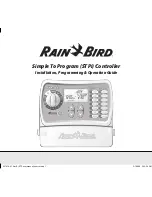
Chapter 2: Fault finding – communication
10
ZP3-ECU Extinguishing Control Unit Maintenance Manual
General Information
When tracing and correcting faults, observe the following guidelines and
precautions:
• Before starting any fault finding procedures, make sure that the system as a
whole is calibrated correctly. Check the high reference analogue (reading 1)
from several devices covering the length of the loop. The reference value
should be between 205 and 218.
• If there appears to be a problem, disconnect the loop and connect a single
detector to the panel. Check that the reading is within the above parameters.
• When tracing a fault on a device or alarm line, the recommended procedure is
to split the line in half and check in which half the problem is located.
Continue this procedure, dividing the suspect region of the line in half until the
exact location of the problem is identified.
Precautions
• Never use a megger (or any other high-voltage instrument) on detection or
alarm lines while there are any devices connected to them. This causes
irreparable damage to the devices.
• Never replace a panel PCB, or any other components while the power is
connected. This could damage them irreversibly.
• Never replace a fuse with one that has a higher amperage rating than that
specified.
• Whenever replacing loop devices make sure that the address settings on the
replacement units match those of the units they are replacing.
The fault list describes faults that can be raised by the fire alarm control panel.
The following information is given for each fault:
• Fault name
• Fault description
• Panel indications
• Possible causes
• Corrective actions
Panels are configured to sound a fault buzzer when a fault is raised. The buzzer
sounds approximately every three (3) seconds. A yellow Fault LED also
illuminates. After acknowledging the fault by accepting it, the buzzer sounds only
every fifteen (15) seconds. After correcting the fault, reset the panel – this returns
the panel to normal status and the Fault LED goes out.
















































